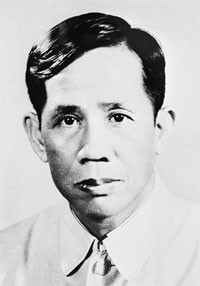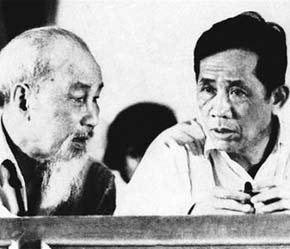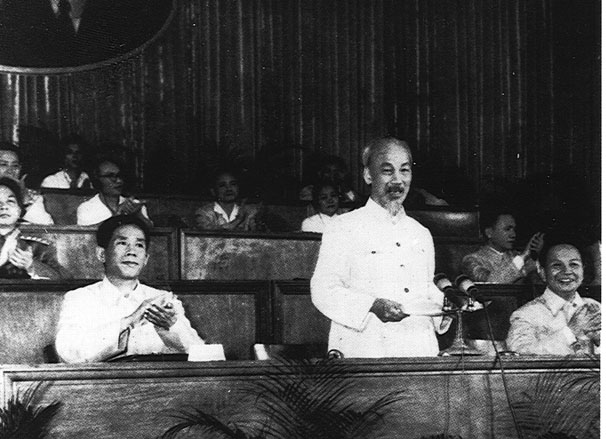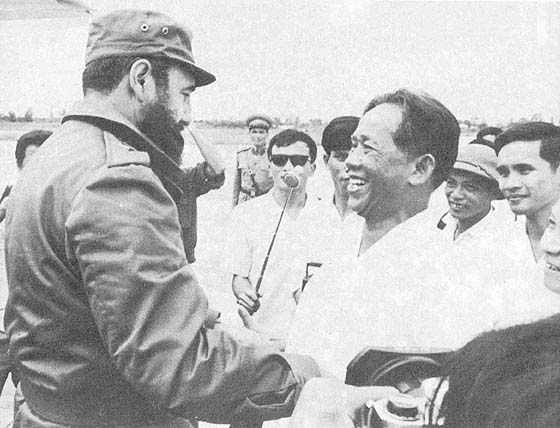<Back to Index>
- Inventor Ole Kirk Christiansen, 1891
- Painter El Greco (Δομήνικος Θεοτοκόπουλος), 1541
- General Secretary of the Communist Party of Vietnam Lê Duẩn, 1907
PAGE SPONSOR


Lê Duẩn (April 7, 1907 – July 10, 1986) was a Vietnamese communist politician. He became North Vietnam's acting party chief in late 1956. By 1958, he was the country's top policy maker, although nominally number two behind figurehead Ho Chi Minh. He officially became the top leader when Ho died in 1969. He led a unified Vietnam from 1975 until his death in 1986. He was a driving force during the Vietnam War (1959 - 1975).
Le Duan was introduced to communism while a railroad worker during the 1920s. He was a founding member of the Indochinese Communist Party. Le Duan served on the North Vietnamese Central Committee under Ho and directed the formation of an underground communist organization in South Vietnam. Beginning in 1946, he was Secretary of Cochinchina Party Committee (later Secretary of COSVN 1951 - 1954). In 1956, Le Duan wrote a thesis called "The Road to the South", which called for war with the United States to achieve reunification. The communist leadership discussed this plan at a meeting in December 1956, and accepted it contingent on reform of the army and international support.
Throughout 1956, the party had been split by factional rivalry between party boss Truong Chinh and President Ho, who was supported by Vo Nguyen Giap. This rivalry focused on the issue of land reform in North Vietnam. As Le Duan was identified with neither of these factions, neither objected when he began performing the duties of first secretary (head of the communist party) on behalf of Ho in late 1956. At the May Day parade in 1957, Truong Chinh was still seated as No. 2 leader. But Le Duan was gradually able to place supporters, notably Lê Ðức Thọ, in top positions and outmaneuver his rivals. He visited Moscow in November 1957 and received a green light for his war plans regarding the South.
In December 1957, Ho told the 13th Plenary Session of a "dual revolution," implying that Le Duan's efforts to promote insurgency in the South were just as important as Truong Chinh's internal reforms. In early 1958, Le Duan met with southern communist leaders and explained the shift in policy to them; An upsurge in violence followed. On May Day 1958, Le Duan was, for the first time, seated as the number two leader, thus displacing Truong Chinh. The North Vietnamese leadership formally approved a "people's war" in March 1959. Le Duan officially became first secretary in 1960. Le Duan was able to use the Sino - Soviet split and the Vietnam War to extract aid from both Moscow and Beijing with no strings attached. Soviet Premier Alexei Kosygin made extensive commitments, including modern anti - aircraft missiles, during meetings with Le Duan in Hanoi in February 1965.
After Ho's death in 1969, Le Duan assumed formal leadership of North Vietnam's government. After the communist takeover of South Vietnam in 1975, Le Duan became leader of a unified Vietnamese state. After becoming leader, Le Duan instituted a purge of South Vietnamese American allies, with up to 400,000 people consigned to prison camps. He approved a Vietnamese invasion of Cambodia late in 1978 to overthrow the Chinese backed Khmer Rouge government of that country. This caused a disruption in relations between Vietnam and China, and Vietnam responded by deporting ethnic Chinese residents of the country and cultivating a closer alliance with the Soviet Union. China launch an invasion of Vietnam in February 1979, known as the Sino - Vietnamese War. In 1979, Le Duan was awarded the Lenin Peace Prize.
Le Duan remained general secretary until his death in 1986. He died of natural causes in Hanoi at age 79 and was briefly succeeded by his old rival Truong Chinh. Le Duan was also known as Le Dung, and was known publicly as "anh Ba", or "Second Brother." Nikolai Ryzhkov, the Chairman of the Council of Ministers, represented the Soviet Union at his funeral.

